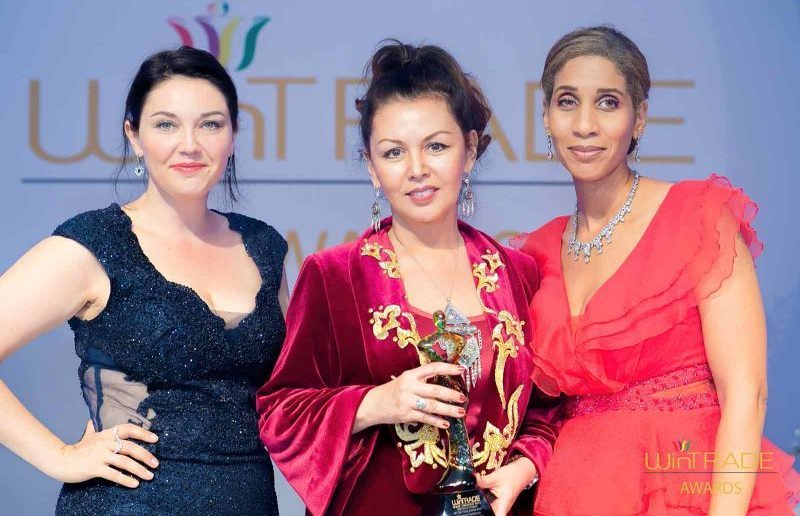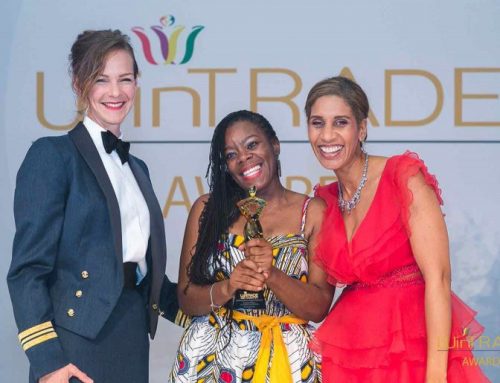Featured Member Album
And the winner of the WinTrade Woman Of The Year 2019 is… Akmaral Batalova!
This was announced on a warm night in June 2019 at the Westminster Plaza hotel, London, and it ushered in another exciting chapter in the life of the Kazakh journalist extraordinaire.
Some one hundred and sixty-four days later, I have the privilege of interviewing Akmaral from her home in Kazakhstan.
Life Inspirations
“My genetic memory of World War II was my introduction to international conflict…it’s in my blood”, she explained in preamble, answering on my first question.
I didn’t have to wait long for her next words …. “Grandmothers on both sides of my family continue to be an inspiration in life” she said in anticipation of my next question.
“Heavily pregnant and with four children on tow, my maternal grandmother fled her husband’s house in Kazan, Tatarstan, during the Second World War, for relative safety, to be with her brother in Alma-ata city, Kazakhstan.
My grandfather was already at war. Whilst on a train with her children, their location came under a heavy aerial attack. My grandmother went into labour.
She had to leave the train, giving birth to my mother on the platform, before returning to the train and continuing her journey. Grandmother from my father’s side also was very strong person”.
Resilience and Optimism
She added that it was the resilience and the eternal optimism through unprecedented times of then young women, that remains a source of inspiration to her.
Akmaral explained that both of her grandmothers were made widows during the Second World War, a tragedy that was worsened by the fact that neither were able to locate their husband’s graves.
Like his mother before him, her father searched in vain for his father’s grave and years later, Akmaral and her son were finally able to make the ancestral discovery. However, this story was far from over.
Perseverance In Adversity
As it turned out, they didn’t only find their fallen grandfather. With the help of Embassy of Kazakhstan and Russian Ministry of Defence, they uncovered a mass burial site of over 280 unidentified fallen soldiers and officers in Romania.
A major exhumation programme was launched, which resulted in the successful identification and appropriate laying to rest of almost 300 fallen men from Kazakhstan, Uzbekistan, Georgia, Armenia, Belarus and other countries in the region.
These soldiers were part of the Soviet army that was formed from representatives of 15 republics – who all fought together during the war.
Positives and Negatives
Still reeling from her role in this major development, I enquired about her childhood. “Growing up in the Soviet Union had some negative sides, but it also had its positives” she said candidly.
“There was no democracy and freedom of speech wasn’t encouraged, however, the education and medical services were free, and we grew up with a sense of internationalism, which taught us that there is no difference between races and nations and that all people should be equal in their rights.
When I was a child I wanted to be a ballerina and loved art, literature and often expressed myself in writing.
We grew up on a steady diet of war literature – poems and stories of heroes in the Second World War, and how their sacrifice helped grow the homeland in the hope that we would protect it like our ancestors did. Propaganda? Maybe”.
Plan Out The Window
Akmaral’s verbal flow is formidable. Her razor-sharp mind and her ability to segue her stories into the overall narrative of the interview, rendered me a mere spectator. I tear up my plan, I’m in her hands now.
I ask her about her call to journalism as a profession. “It was my first career” she said rather coyly, hinting of more to follow.
“After qualifying at the age of 23, I was offered a job in the Department of Foreign Affairs in The Administration of the President of Kazakhstan. At the time, I already had a son, and after my daughters were born I decided to leave my career after six years of work.
Akmaral then explained that whilst looking after her children, she went back to university part-time, studying at the Diplomatic Academy in Kazakhstan. Later, she also graduated with a Masters in Foreign Affairs at the Complutense University and undertook courses in the Diplomatic School of Madrid.
As if in mitigation, Akmaral added: “I have a very supportive husband, who encouraged me to get further qualifications.
Behind Every Great Woman…
He believes as an educated mother I can better inspire and encourage the children to have a greater aptitude towards education”.
I also learned that during this ‘away from work’ period Akmaral also became a restauranteur, establishing and running a Haute Cuisine restaurant in Almaty – where she was born – inviting Michelin star chefs from around the world and organising masterclasses for the chefs and gala- dinners for the public.
We have been talking for over an hour and were yet to cover the piece of journalistic work that gained her a critical acclaim and led to her winning the 2019 WinTrade Woman of the Year Award.
When I asked about Syria, Akmaral’s voice went quiet, as she described the international humanitarian tragedy that would change her life. “All ex Soviets always make speeches and toast when they sit around the table” – she opened elegantly. “Even now it is still our custom.
Before Syria my speeches would be about love, children, friendship, and many other things, but now it is about one thing…World Peace”.
Her voice now became almost rhythmic as she went on to explain why.
First Hand Crisis Witness
She personally witnessed the Syrian refugee crisis whilst on a family holiday in Turkey in 2015. At that time, according to official statistics, there were some 889,000 Syrian refugees crossing the Turkish border in search for a better tomorrow, as a direct result of war in their homeland. This triggered Akmaral’s ‘genetic memory’.
In her quest to understand why this was happening, she ceased becoming a spectator. She intermingled with the displaced Syrians from across the border, speaking to them and learning of their experiences in pursuit of peace.
In doing this, she witnessed up close the human tragedies, the compulsions that lead them to do the unthinkable things, such as travelling the nearly 700 kilometres across the Mediterranean in a small rubber boat.
Interacting With Refugees
In order to know more, a journalist and her husband travelled to Greece later that year, where over half a million Syrian refugees were located. Once again, Akmaral went out of her way to interact with the refugees, learning of their stories. Upon returning to Kazakhstan, Akmaral explained that she “read everything there was to read on the Syrian Crisis in different languages.
Some information was hard to find and to understand the true meaning behind the text, as the subject matter was very controversial”. However, she was determined to learn more. In 2017, the Syrian Peace Talks in Kazakhstan started.
These were called “the Astana Process”, and Akmaral was able to gain access to observe the negotiations and covered them in multiple articles.
Exposing News and Creating Documentaries
This also led her to make two documentaries – the first about the results of the Process itself, and the second about how to avoid the radicalisation of Islam in Kazakhstan – using the lessons drawn from the Syrian crisis.
As a result of this, she was commissioned to film a documentary about the work Kazakhstan has done as a non-permanent member of the UN Security Council. For this, she travelled across the world, including visiting Washington and New York.
There, she participated in critical discussions with various think-tanks, as well as interviewed representatives of different countries and the UN Secretary General, António Guterres.
Akmaral still cites the documentary she did for the Astana Process as a seminal piece of work. “I thoroughly interviewed both sides of the Syrian conflict for everyone to see and to understand them better.
I believe the journalist’s duty is to report the opinion of all parties involved in the conflict, to enable and encourage the public to think and to make up their own minds”.
Passion & Pain
I enquired what clarity she found as a result of her journalistic involvement? At this point Akmaral’s voice changed. The passion remained but the pain and anguish of her recollections was palpable in the way you might see an orchestral conductor motioning for a crescendo “the rightful wish of the Syrian people to have some democratic reforms was hijacked by international terrorism phenomena sponsored and supported by different countries.
Some big powers, having their own interests, want the regime change in Syria. Other countries, for clearly non-altruistic reasons, want to keep the current Syrian government in power. However, who suffers in the results of this confrontation?
Without skipping a beat, Akmaral continued….”it is the ordinary Syrians who have paid the ultimate price in this endless war.
It’s Ordinary People Who Pay The Price Of War
With their lives and the lives of their loved ones under the bombardment and shelling from both fighting sides, with their bodies emptied by organ harvesting mafia, or drowned in the sea as they sought to reach a peaceful place, with their children kidnapped by human traffickers.
These ordinary people are also suffering unimaginably due to the economic sanctions, hunger and loss of their homes and their country. Finally, the basic human rights of Syrians were sacrificed in favour of common interests”.
I paused for a few moments to take in what was just said. It was abundantly clear to me that Akmaral honours the casualties among ordinary people who always suffer most as the result of all political games and bloody wars. The journalist and a humanitarian, she clearly wished there was no need for such a piece of work as hers.
While Akmaral is also talking about the cultural devastation in Syria, such as the destruction of Palmyra and the Old City of Aleppo, which is a UNESCO World Heritage Site, I have an epiphany. Despite being aware of the male interviewer’s faux pas where we unwittingly diminish a powerful woman to their physical appearance at the expense of their accomplishments, I see her beauty in her humanity.
Heart And Soul
Akmaral is beautiful. She possesses beauty of the heart and the soul. She has made the connection between the people, their culture and their cause, yet through her elegance, articulation and sheer determination, Akmaral has managed to open dialogue not only with the people at the sharp end of the conflict, but with the people from the opposing view who ostensibly could be accused of causing the conflict!
All so that people in her country and ultimately, the world, can learn from this heart-breaking chapter in our global history.
Through her genetic predisposition to conflict, she sought not to fight, but to understand, she sought not to blame, but to reason.
As we say our goodbyes, Akmaral tells me she unwinds with yoga and being in nature, and tells me that I will not often find her on social media – she is trying to spend as much time with her family as possible.
Stopping Conflict With a Headscarf!
She leaves me with a custom; “A woman’s headscarf in my culture is a symbol of wisdom, motherhood and purity of love. Since the ancient times, if a woman throws a headscarf on the ground between the two fighting parties, it means that the mothers have had enough and any conflict must be stopped – and it worked.”
Her dream is for mothers to return their right to stop the wars. What a perfect way to end an interview, I thought… and what a brilliant way to inspire women around the world for global peace…
We haven’t heard the last of Akmaral Batalova…a most deserving WinTrade Woman of The Year 2019.


